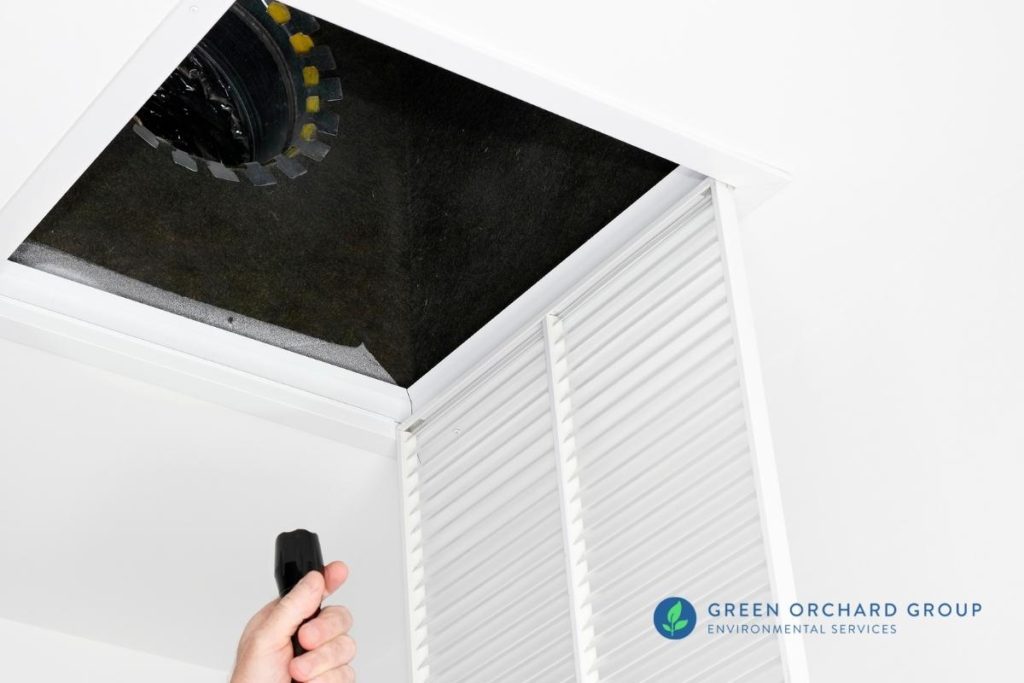
Mold inspections are by no means a requirement when buying a house, but getting one can potentially save you thousands of dollars and a lot of stress.
Here’s why homebuyers should consider getting a mold inspection before signing on the dotted line.
In states like New York, homeowners are not required to fix or remove mold problems before they sell their house.
While sellers may be required to disclose any known issues of mold, the key word here is “known.” When a properties is listed, sellers rarely go out of their way to look for mold to disclose. And if they don’t know about it, they don’t have to do anything about it.
Therefore, the onus is often on the buyer to check for mold before buying. Caveat emptor, or “buyer beware”, as they say.
Why You Should Get a Mold Inspection Before Buying a House
A pre-purchase mold inspection involves having a licensed mold professional do a comprehensive investigation for any possible areas of mold, as well as any conditions that can lead to mold growth in the future.
As a diligent home buyer, you may already be getting a general home inspection to check for any obvious defects. However, a home inspection is not a mold inspection — a common misconception that might cost you thousands, or even tens of thousands, of dollars in repair and mold removal costs later on.
It is not a home inspector’s job to check for mold. Most will mention signs of water damage or potential mold issues if they come across it, but they won’t go out of their way to look for it.
This is a problem because water damage and mold growth often starts in places that are hidden from sight: behind walls, under floorboards, in dark corners of basements and crawlspaces, etc.

Given the right conditions, mold can grow quickly and pose significant risks to the structural integrity of your home as well as your health and your family’s health.
That said, mold inspections aren’t cheap. You’ll need to find a local company that’s licensed to perform mold assessments, which can cost anywhere from a few hundred to a few thousand dollars, depending on the size of the house. But if you think about it as a way to protect the value of your new home, as well as your family’s health, it’s well worth the investment.
PROS
- A licensed mold inspector can help locate hidden areas of water damage and mold growth.
- A mold inspection will also uncover and help you address the underlying causes of excess moisture or water damage.
- Finding mold before you buy gives you leverage to negotiate with the seller to fix the problem, give you a credit to fix the problem, or lower the selling price.
- It’s much easier (and cheaper) to remove mold before you move in.
- It protects your family’s health. Don’t wait until someone starts feeling sick before looking for mold.
CONS
- It’s another expense.
- You may need to pay for the mold inspection out of pocket.
- The seller might be unwilling to negotiate even if mold is found.
The Difference between Mold Inspections and Mold Testing
Some home inspections include “mold testing” or “air sampling” as an add-on. This is not the same as a mold inspection.
Air sampling and mold testing involves the home inspector taking samples from the air or surfaces and sending them to a laboratory for analysis.
By itself, testing air samples for mold is not sufficient to determine whether or not the house you’re buying has mold. As we mentioned before, mold growth often occurs in hidden places that are difficult to detect. Taking an air sample in a bedroom won’t reveal potential mold growing inside the walls.
A mold inspector may utilize mold testing or air sampling when necessary, as one part of a comprehensive assessment. However, a standalone air sampling for mold during home inspection is not enough.
Where to Look For Mold
Mold likes to grow in dark, damp places. Exposure to water or excess moisture is the main condition that allows mold to thrive. Common places to inspect for mold include:
- Inside walls and crawlspaces
- Under sinks and around plumbing lines
- Underneath floorboards
- Inside air vents
- Indoor air handlers and furnaces
- Basements and attics
- Windowsills
- Chimneys
What to Do if You Find Mold in Your Dream Home
If your pre-purchase mold inspection uncovered signs of mold, consider yourself lucky. You can take the inspection report back to the seller and negotiate for them to either fix the problem or lower the selling price to help cover mold removal costs.
Even if the seller refuses to negotiate, you have the option to walk away. Get a quote from a licensed mold remediation company to determine how much it would cost to repair the mold issue, and use that knowledge to determine whether or not you still want to move forward with the purchase.
Professional Mold Inspectors in New York City
Green Orchard Group is a leading environmental health and safety firm based in New York City. We have over 25 years of experience as licensed professional mold assessment and remediation experts.
If you’re in the process of buying a new home and need a pre-purchase mold inspection, call (212) 219-8261 or use the button below to contact us for a free quote.
